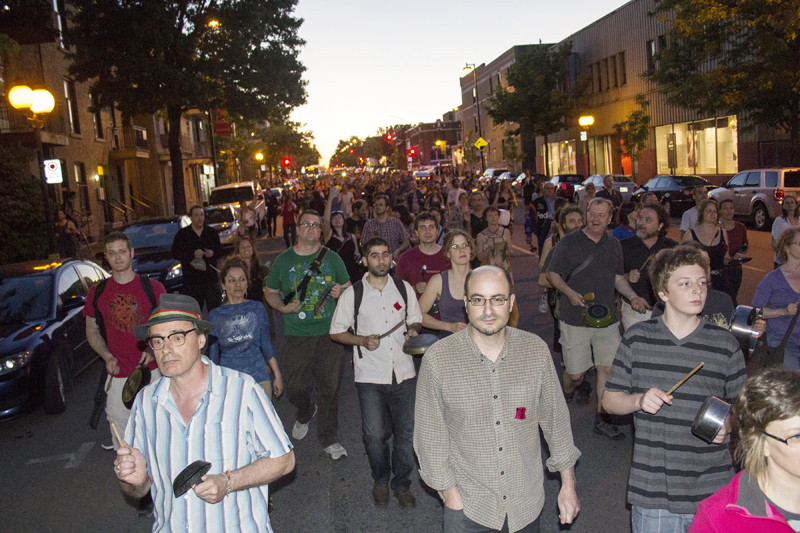Quebec student movement, Occupy Wall Street replete with flaws
Protesters, policymakers need to find common ground, respect
As thousands of Quebecers continue to defiantly take to the streets of Montreal against Premier Jean Charest’s Liberal government, their indignation has been compared to the Occupy Wall Street movement that stole headlines across North America and much of the developed world last fall.
Although vastly different, both movements have made an important contribution to the global dialogue around austerity, inequality and the role of government.
Both, however, are replete with flaws, including an entrenched mindset that assumes the street, rather than the ballot box, is the primary venue for political change.
But while Quebec students remain fixated on modest tuition increases, Occupy Wall Street continues to bring arguably the most important issue of the 21st century to the fore - mounting inequality.
Ultimately, in the case of the Quebec student movement, the protesters harbour a problem of substance. In the case of Occupy Wall Street, it remains a problem of style.
On the 100th day of student protests, many Canadians (myself included) were moved as hundreds of thousands of Quebecers flooded the streets of Montreal to assert their civil rights in defiance of Bill 78, emergency legislation to clamp down on protests.
The Quebec Bar Association has decried many of the bill’s measures as violating the rights of peaceful assembly and freedom of association. Some have compared the bill to the 1970 War Measures Act and the Public Works Protection Act, which led to severe abuses of power by police in Toronto during the 2010 G20 summit.
It was Bill 78, which shifted the emphasis of the movement from tuition to the violation of civil liberties, that galvanized popular support outside Quebec (and even within the province).
Suddenly it became meaningful, even “revolutionary,” to don the emblematic red square.
Student protest leader Gabrielle Nadeau-Dubois became an overnight celebrity.
I’m just as outraged by Bill 78 as well as the rampant corruption between the Charest Liberals and the provincial construction industry as Nadeau-Dubois and his supporters appear to be.
I believe an unconstitutional law should be flouted and that protests against corruption are warranted.
However, I remain convinced that protests in this regard, though initially powerful and important, have used up their potential.
Bill 78 is currently being challenged before the courts as unconstitutional and the corruption scandal is being investigated by Superior Court Justice France Charbonneau through a public inquiry.
At its core, though, the movement is about tuition fees and using protest disruption as leverage to force the hand of the Charest government.
The movement’s core message, then, is its biggest problem.
Ultimately, average Quebecers and those in the rest of Canada realize that Quebec students already pay the lowest tuition fees in the country.
As part of a package of early concessions to student groups, we know low-income students (ie. with families earning $45,000 a year or less) will be unaffected by the $325 annual increase. We know that Quebec faces significant fiscal challenges and freezing tuition fees blindly (ie. without corresponding economic goals) is foolish.
While many argue the real issue is student debt, surely reversing a modest tuition increase for higher income students won’t put much of a dent in what protesters decry as a profuse, systemic problem.
Additionally, there are other ways of addressing the debt burden beyond a tuition freeze.
In short, the student movement should be lauded for sparking a debate around post-secondary education.
Yet it is astounding how little of value they have contributed to that debate.
But even if tuition is paramount, Premier Jean Charest must call an election before December, 2013 and both social democratic parties in the National Assembly - the Parti Quebecois and Quebec Solidaire - have vocally supported the striking students and have vowed to reverse the planned fee increases.
Why aren’t more students demanding an immediate election call rather than holding out for a tuition freeze?
Perhaps because the Charest Liberals could win yet again. But that’s the give-and-take of democracy.
So why is Occupy Wall Street ultimately more substantial, but less stylish?
Regardless of the trumped-up media attention given to the tents in Zuccoti Park and the communitarian general assemblies, the movement was really about America’s inadequate response to the greatest economic crisis since the Great Depression.
The one per cent versus 99 per cent dichotomy irrevocably changed the way we talk about economic issues. It inserted inequality into a public policy debate that had, up until that point, focused almost exclusively on bank bailouts and corporate confidence, to the exclusion of abating real human misery.
As we face staggering levels of unemployment and a eurozone preparing for collapse, nothing could be more important.
Occupy Wall Street’s problem was one of style.
As police began forcefully evicting campers from public parks and meeting places across North America, and as Occupiers forcefully fought for their “right” to sleep outside, the real message of the movement was lost.
Contrast this with the intense outpouring of emotion accompanied by police crackdown of Quebec student protests, where the movement was strengthened by being off message.
Whether it’s about student debt or macroeconomic policy, what these youth-led movements ultimately seek is a future not plagued by struggle or despair.
Protests are an important venue for voicing this kind of discontent.
But so long as protesters and policymakers refuse to understand their mutual importance and distinct roles, our democratic institutions will not respond or operate as they should.
Ethan Cabel is a politics student at the University of Winnipeg and The Uniter’s news assignment editor.
Published in Volume 66, Number 28 of The Uniter (June 27, 2012)







